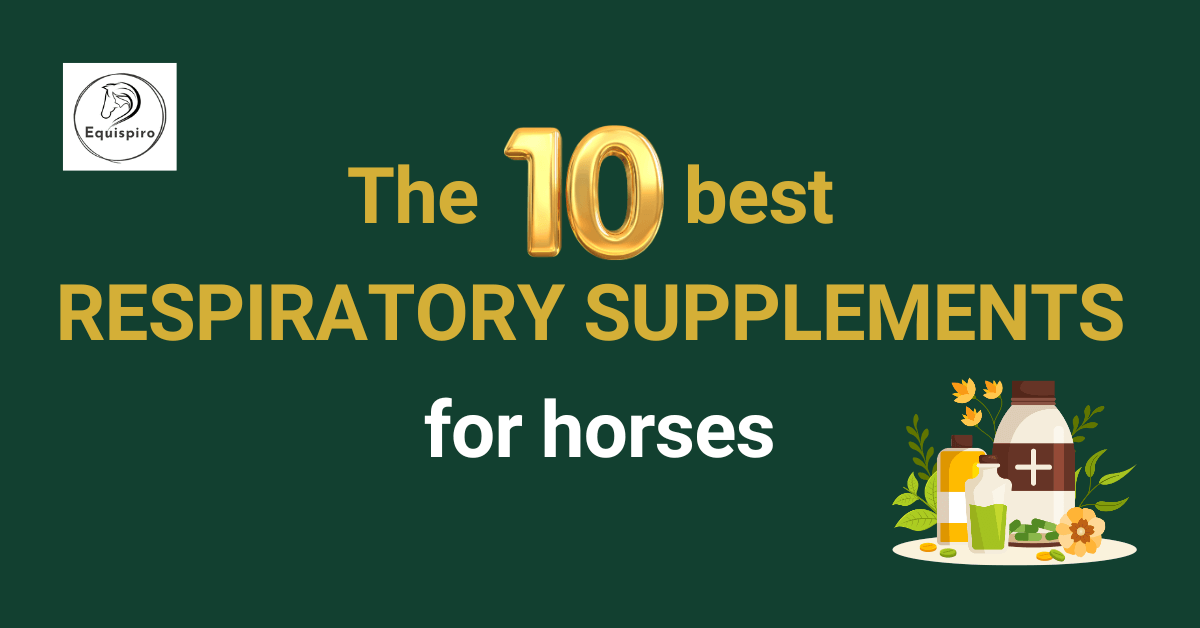When your horse has respiratory issues, every little detail matters – from clean air to high-quality feed. But there’s one remedy that’s often underestimated: the right supplements.
Whether you’re treating mild seasonal issues or supporting a horse diagnosed with equine asthma, certain supplements can be a real help. In this article, we’ll introduce you to the 10 most important respiratory supplements, explain how they work and help you decide which ones are right for your horse.
🥇HIGH PRIORITY – Highly effective for asthma and respiratory diseases
🌿 1. MSM (methylsulfonylmethane)
MSM is a natural sulphur compound that supports healthy connective tissue and has known anti-inflammatory properties.
Why it helps:
It can reduce inflammation of the airways and improve the well-being of horses with chronic coughs or asthma.
How to use:
- Daily powder or pellets
- Often combined with glucosamine for joint support
🐠 2. Omega-3 fatty acids (linseed oil, fish oil)
They are known for their anti-inflammatory effect throughout the body.
Why they help:
- Reduces inflammation of the respiratory tract
- Supports skin, coat and overall immunity
Best sources:
- Cold-pressed flaxseed oil
- Algae-based omega-3 fatty acids (for sensitive horses)
🌱 3. Spirulina
This blue-green algae is a powerful source of antioxidants, amino acids and micronutrients.
Why it helps:
It supports the immune system and can help reduce allergic reactions, including hypersensitive airways.
Bonus: Many owners also report improved coat and muscle tone.
🌼 4. Mullein (Verbascum thapsus)
A classic herbal remedy known to soothe the respiratory tract.
Why it helps:
- Natural expectorant
- Relieves dry or irritated coughs
- Supports the health of the mucous membranes
How to use:
- Dried herb added to food
- Tinctures or syrup (check dosage with a vet or herbalist)
🥈MEDIUM PRIORITY – Supportive effect, suitable as complementary care
💊 5. Vitamin E + selenium (with veterinary advice)
Particularly useful for horses that are fed hay or suffer from chronic inflammation.
Why it helps:
- Supports cell repair
- Combats oxidative stress in the lung tissues
- Selenium enhances the effect of vitamin E
Note: Always consult a vet before supplementing selenium — overdosing is toxic!
🍋 6. Vitamin C
A powerful antioxidant that plays a role in immune regulation and tissue repair.
Why it helps:
- Neutralises free radicals during inflammation
- Helps to keep lung tissue resilient
Note: Horses synthesise their own vitamin C, but may benefit from supplementation during illness or stress.
🌾 7. Herbal mixtures (premixed formulas)
Many manufacturers of dietary supplements offer ready-made mixtures that are tailored to support the respiratory tract.
Look out for mixtures with:
- Mullein
- Liquorice root
- Thyme
- Eucalyptus
- Marshmallow root
These can be an effective way to combine multiple benefits — but always read the labels for fillers or sugar.
💧 8. Electrolytes
Often overlooked in respiratory care, but essential in hot weather or after exercise.
Why it helps:
- Prevents dehydration, which can thicken mucus
- Supports normal recovery of respiratory rate
Tip: Use sugar-free, balanced electrolyte supplements.
🥉LOW PRIORITY – Auxiliary or traditional supplements
🌿 9. Garlic (in moderation)
Traditional remedy with antibacterial, antiviral and immune-boosting properties.
Why it helps:
- Can reduce the risk of secondary infections
- Helps to keep the airways clear
Caution: Use sparingly and avoid in horses with anaemia or ulcers.
🍯 10. Honey + apple cider vinegar
A popular household remedy, used in moderation.
Why it helps:
- Honey soothes the throat
- Apple cider vinegar can support the thinning of mucus and pH balance
Application:
- Add to food or water (ensure palatability and hygiene)
✅ Final tips before you supplement
Before you supplement your horse:
- Consult your vet, especially if your horse is on medication
- Read the list of ingredients — avoid added sugar, alfalfa (for some) or artificial flavours
- Start with one supplement to test the effect
- Quality before quantity — buy from reputable brands
❤️ Supporting the breath, one scoop at a time
Supplements can’t cure asthma in horses — but they can be an important part of your daily management plan. Combined with clean air, proper feeding and veterinary care, they can help your horse breathe easier and live better.
💬 My personal experience
With my own horse, who has a very difficult time in hot weather, I have learnt first hand about the world of respiratory supplements.
What I am currently using:
- MSM – to help manage airway inflammation
- Omega-3 (linseed oil) – for its anti-inflammatory and immune-boosting effects
- Vitamin E + selenium – on the advice of the vet to support tissue repair and antioxidant protection
- Electrolytes – important in summer to keep mucus thin and hydration optimal
What I am currently testing:
I’ve recently started trying mullein and spirulina based on recommendations from US horse owners struggling with similar issues. I chose spirulina in particular because it’s rich in amino acids — my horse is still building muscle after a long break due to illness last year and is slowly getting fit again.
What I avoid:
One thing I no longer use is eucalyptus. I gave it last year during an acute phase and unfortunately it seemed to aggravate his condition — probably because of its strong and drying properties.
Initial observations:
I am still cautious about drawing conclusions as we are in the middle of summer, but so far my horse is coping much better with the heat than last year. This gives me hope that we are on the right track.

